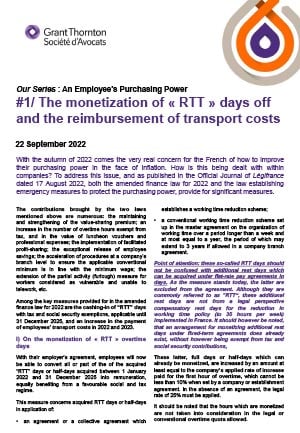With the autumn of 2022 comes the very real concern for the French of how to improve their purchasing power in the face of inflation. How is this being dealt with within companies? To address this issue, and as published in the Official Journal of Légifrance dated 17 August 2022, both the amended finance law for 2022 and the law establishing emergency measures to protect the purchasing power, provide for significant measures.
The contributions brought by the two laws mentioned above are numerous: the maintaining and strengthening of the value-sharing premium; an increase in the number of overtime hours exempt from tax, and in the value of luncheon vouchers and professional expenses; the implementation of facilitated profit-sharing; the exceptional release of employee savings; the acceleration of procedures at a company’s branch level to ensure the applicable conventional minimum is in line with the minimum wage; the extension of the partial activity (furlough) measure for workers considered as vulnerable and unable to telework, etc.
Among the key measures provided for in the amended finance law for 2022 are the cashing-in of “RTT” days with tax and social security exemptions, applicable until 31 December 2025, and an increase in the payment of employees' transport costs in 2022 and 2023.
I) On the monetization of « RTT » overtime days
With their employer’s agreement, employees will now be able to convert all or part of the of the acquired “RTT” days or half-days acquired between 1 January 2022 and 31 December 2025 into remuneration, equally benefiting from a favourable social and tax regime.
This measure concerns acquired RTT days or half-days in application of:
- an agreement or a collective agreement which establishes a working time reduction scheme;
- a conventional working time reduction scheme set up in the master agreement on the organization of working time over a period longer than a week and at most equal to a year, the period of which may extend to 3 years if allowed in a company branch agreement.
Point of attention: these so-called RTT days should not be confused with additional rest days which can be acquired under flat-rate pay agreements in days. As the measure stands today, the latter are excluded from the agreement. Although they are commonly referred to as "RTT“, these additional rest days are not from a legal perspective compensatory rest days for the reduction in working time policy (to 35 hours per week) implemented in France. It should however be noted, that an arrangement for monetizing additional rest days under fixed-term agreements does already exist, without however being exempt from tax and social security contributions.
These latter, full days or half-days which can already be monetized, are increased by an amount at least equal to the company’s applied rate of increase paid for the first hour of overtime, which cannot be less than 10% when set by a company or establishment agreement. In the absence of an agreement, the legal rate of 25% must be applied.
It should be noted that the hours which are monetized are not taken into consideration in the legal or conventional overtime quota allowed.
The social and fiscal regime applied to the remuneration due under this new “cash-in” measure is aligned with that applied to paid overtime. Thus, the cashed-in days which are paid to the employee benefit from:
- a reduction in the employee contributions, regardless of the size of the company's workforce;
- a flat-rate deduction of the employer's contributions for companies with less than 20 employees;
- an exemption of income tax up to €7,500 net for hours worked as from 1 January 2022 (previously set at €5,000 net).
II) On travel expenses
For the years 2022 and 2023, the Amending Finance Act for 2022 revisits the 3 legal provisions in place regarding the employer’s payment of employee transport costs between their usual place of residence and their place of work.
- Regarding the obligation to cover 50% of an employee’s public transport season ticket: the threshold for social and tax exemptions is now raised to 75% of the cost of the season ticket (as a reminder, any reimbursement by the employer of more than 50% of this cost was optional).
- Regarding the transport allowance: where the employer can cover all or part of the fuel costs and other energy costs incurred by an employee to power his/her vehicle: this allowance is now open to all employees without condition and is combined with the compulsory coverage of public transport season tickets.
- Regarding the sustainable mobility package: where the employer has the option to cover all or part of travel costs incurred when an employee comes to work using a bicycle, carpooling or scooter: the ceiling for tax and social security exemptions has been raised in the event of a cumulation with:
- the transport allowance, to an amount of €700 per year (instead of €500 previously), including a maximum of €400 for fuel costs (instead of €200),
- public transport season ticket, to €800 per year (instead of €600).
***
The next issue in our series “An Employee’s Purchasing Power" will look at the measures in place in favour of profit-sharing.
Our team at Grant Thornton Société d’Avocats remains at your disposal to assist you in the implementation of these new measures in the framework of your company’s HR policy.





